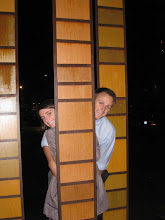Earth Sciences and health promotion... it was a correlation similar to Peace Corps designating me a Community Health Educator based on my communication's internship in the Central Ohio Diabetes Association. "I would be happy to," I replied.
So we sat down, David and I, and that first week we calculated gradient. Turns out my brain was able to dust off my high school education after all. I was very concerned, however, that what he might throw at me in subsequent weeks would prove my incompetence and break my director's 'perfect fit' ideal.
Yesterday David comes in and presents me with his Regents exam packet. Students are allowed to use this guide during the examination, but they obviously need to know each topic proficiently to be able to use the guide. He says, "I hate C14." I thought to myself. "Me too."
He was specifically struggling with the concept of the half life of isotopes. C14 was just the first one, but there are three other calculations he needed to understand as well. We started the only way I could imagine -- he let me read the book. All of a sudden I decided to use what I knew which was health.
"David," I said. "Think about people. What would a human's half life be?" He said 50 years which sounded good to me. I told him the half life of carbon was not 50, but 5,730 years and I asked him what characteristics people exhibit when they've reached their half life. "Wrinkles, a bad back, muscle soreness, maybe." We were on a roll. I explained that people can do things to change our half life. Smoking, drunk driving and extreme sports all affect our condition when we reach our half life. Carbon, interestingly enough, is not affected by any external conditions. It is going to age by 5,730 years regardless of pressure, temperature or light.
We went on to discuss how when humans reach half life we don't change into anything else. We decompose. We began talking about decomposition, trash and compost and I quickly realized I was getting off topic. "Carbon, however, changes into lead. So every 5,730 years there are going to be smaller percentages of carbon and larger percentages of lead in the sample. This goes on indefinitely," I read. We looked at the questions on his homework and by the grace of God my explanation worked. He completed the entire assignment perfectly. He was proud of his understanding.
I'll admit, we turned to problems in the book and got stuck on one of the calculations. Fortunately for both of us David is strong at math. He'll check that question with his teacher tomorrow.
My director was right. Despite my doubts, despite my intimidation, despite my lack of qualifications I can serve this ninth grader. At the very least he is getting positive reinforcement from someone learning right along with him.

2 comments:
What a great opportunity for you and for David! May, you sound like a gifted teacher...if you ever wanted to pursue that....
You are too funny. Look at all you are learning about earth science. And all you thought there was to it was moss and what existed in your rock collection :)You are learing along with your student and having fun. I'd like to know what David tells his teacher at school and how he does on his tests.
Love,
Mom
Post a Comment